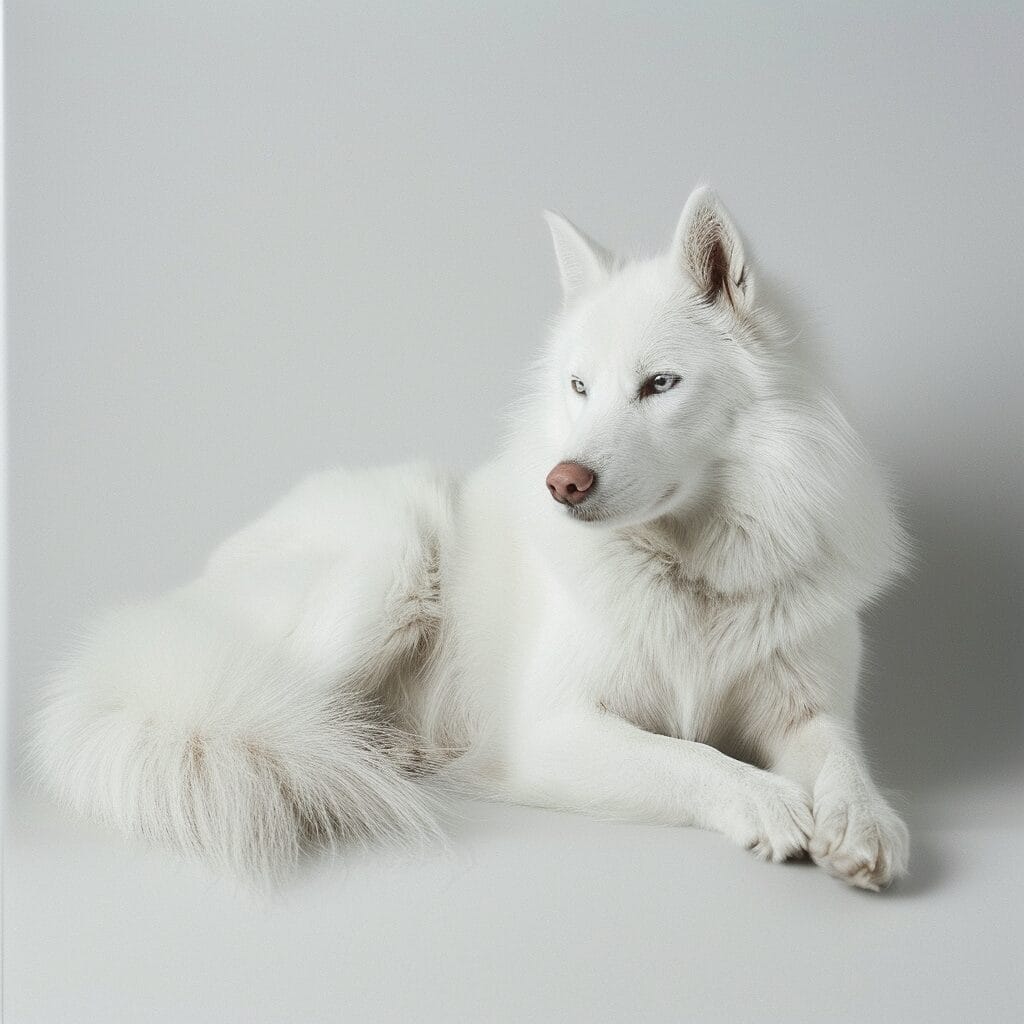Curious about whether Alaskan Klee Kai bark a lot? Understanding what triggers their barks can help you manage this behavior effectively.
Stay tuned for insights on training techniques, socialization tips, and more to keep those woofs in check.
Do Alaskan Klee Kai Bark A Lot?
Key Takeaways
- Understanding the barking behavior of Alaskan Klee Kai is crucial for effective management.
- Factors like socialization, environment, and individual personality influence the barking tendencies in Alaskan Klee Kai.
- The personality and temperament of Alaskan Klee Kai play a significant role in their barking habits.
- Consistent training and behavior management techniques are key to reducing excessive barking in Alaskan Klee Kai.
- Meeting the exercise needs of Alaskan Klee Kai can help curb excessive barking due to pent-up energy.
- Proper grooming and health maintenance contribute to a balanced and content Alaskan Klee Kai.
Alaskan Klee Kai Barking Behavior

Alert Nature
They tend to bark at any unfamiliar noise or sight.
Training and Management
Proper training is essential to manage an AKK’s barking tendencies.
Factors Influencing Barking in Alaskan Klee Kai

Role of Environment, Socialization, and Genetics
Alaskan Klee Kai (AKK) barking tendencies are influenced by environment, socialization, and genetics. Good socialization helps them feel more secure in different situations, reducing the need for excessive barking. Genetics play a crucial role; some AKKs inherit a predisposition to bark more frequently than others.
Understanding these factors can help address barking issues effectively. For example, if an AKK comes from a lineage with a history of excessive barking due to genetics, proactive training and management strategies can be implemented early on.
Loneliness and Boredom Triggers
Loneliness or boredom often serve as triggers for excessive barking in Alaskan Klee Kai. When left alone for extended periods without proper mental stimulation or companionship, AKKs may resort to barking as a way to communicate their distress or seek attention.
In such cases, ensuring that your dog receives ample attention when you’re present can help alleviate feelings of loneliness and reduce unnecessary barking episodes.
Personality and Temperament of Alaskan Klee Kai

Barking Behavior
Alaskan Klee Kai temperament is influenced by several factors, including their natural instincts. These dogs are known to be alert and vocal, which may result in frequent barking. AKKs often bark to express excitement, alertness, or as a response to unfamiliar stimuli.
Due to their strong prey drive and protective nature, they tend to bark at perceived threats or when they feel anxious. However, proper training can help manage excessive barking behavior in these dogs. Teaching them commands like “quiet” and providing enough mental stimulation can reduce unnecessary barking.
Training Techniques
Training plays a crucial role in addressing the barking habits of Alaskan Klee Kai effectively. Consistent training sessions focusing on obedience commands can help establish boundaries for temperamentally expressive breeds like AKKs.
Addressing any underlying anxiety or boredom through regular exercise routines and interactive playtime can significantly reduce their urge to bark unnecessarily.
Training and Behavior Management for Alaskan Klee Kai

Positive Reinforcement
Consistent dog training with positive reinforcement is essential when dealing with the tendency of Alaskan Klee Kai to bark excessively. By rewarding good behavior, such as staying quiet instead of barking unnecessarily, you can effectively communicate to your AKK what behaviors are desirable.
Rewarding your Alaskan Klee Kai not only helps in curbing their excessive barking but also strengthens the bond between you and your furry friend.
Socialization Importance
Early socialization plays a crucial role in shaping an Alaskan Klee Kai’s behavior towards barking. Exposing your AKK to various environments, people, and other animals from puppyhood helps them become well-adjusted adults who are less prone to anxiety-induced barking.
Mental Stimulation Benefits
These activities keep their minds occupied and prevent boredom-induced vocalizations that often lead to excessive barking episodes.
Exercise Needs of Alaskan Klee Kai

Regular Exercise for AKKs
Alaskan Klee Kai (AKKs) are energetic and intelligent dogs that require regular exercise to maintain their overall well-being. Without adequate exercise, these dogs can become bored, leading to behavioral issues such as excessive barking.
Regular physical activity helps prevent AKKs from developing pent-up energy, which can manifest through incessant barking. Moreover, engaging in various forms of physical activity strengthens the bond between you and your furry companion while promoting a healthier lifestyle for both of you.
Benefits of Sufficient Exercise
When these dogs are adequately exercised, they are less likely to bark excessively out of boredom or frustration. Instead, they will be more content and relaxed after expending their energy through playtime or walks.
Pros:
- Reduces chances of behavioral problems.
- Strengthens the bond between owner and pet.
- Promotes overall health and well-being.
Cons:
- Requires time commitment from owners.
- Weather conditions may limit outdoor activities at times.
Grooming Guide for Alaskan Klee Kai

Regular Brushing
Alaskan Klee Kai (AKKs) have a double coat that needs regular brushing to prevent mats and tangles. This helps distribute natural oils, prevents shedding, and keeps their coat healthy and shiny.
It’s an excellent bonding time with your furry friend while keeping them looking neat and well-groomed.
Occasional Bathing
While bathing should be done occasionally for Alaskan Klee Kai, it is essential not to overdo it as frequent baths can strip their skin of natural oils. Use a mild dog shampoo specifically formulated for sensitive skin to avoid irritation.
Pay attention to areas prone to getting dirty like paws and belly during bath time.
Nail Trimming and Dental Care
Nail trimming is crucial for AKKs as long nails can cause discomfort or affect how they walk. Dental care is often overlooked but important – brush your AKK’s teeth regularly with canine toothpaste using a soft-bristled toothbrush.
Health and Nutrition for Alaskan Klee Kai

Balanced Diet Importance
Alaskan Klee Kai are energetic dogs, so providing a balanced diet is essential. Incorporating fruits and vegetables can boost their overall health.
A balanced diet helps maintain your AKK’s weight within a healthy range. Avoid overfeeding treats and monitor portion sizes carefully.
Regular Vet Check-ups
Regular vet check-ups are crucial for monitoring your Alaskan Klee Kai’s health status. Vets can detect any potential issues early on, ensuring timely treatment if needed.
- Benefits of regular vet check-ups:
- Early detection of health problems.
- Tailored advice on nutrition and exercise.
- Establishing a good relationship between your AKK and the veterinarian.
Tips for Managing Barking in Alaskan Klee Kai

Mental Stimulation Activities
Puzzle toys, interactive games, and training sessions can help reduce their barking tendencies by keeping their minds busy. When AKKs are mentally stimulated, they are less likely to bark excessively out of boredom or frustration.
For example, hiding treats around the house or teaching them new tricks can be excellent ways to engage their brains and divert their focus from barking. By incorporating such activities into their daily routine, you can help curb excessive barking behavior effectively.
Avoid Reinforcing Barking
If you respond every time they bark by comforting or scolding them, they may perceive it as a reward for barking and continue the behavior. Instead, try to ignore the barking and only give attention or treats when they are quiet.
Consistency is key when addressing barking issues in AKKs. Ensure that all family members follow the same approach so as not to confuse the dog with mixed signals.
Professional Guidance
If despite your best efforts barking problems persist, seeking professional guidance is advisable.
Professional trainers can offer insights into specific techniques and strategies that suit your Alaskan Klee Kai’s temperament and personality traits.
Considerations for Prospective Owners

Research Characteristics
These pint-sized pups are known for their energetic nature and intelligence, but they also have a tendency to be vocal. By understanding this trait upfront, potential pet owners can better prepare themselves for what to expect.
Alaskan Klee Kais are loyal and loving companions but may exhibit excessive barking if not properly trained or stimulated. This breed requires mental and physical stimulation daily to prevent boredom-induced barking bouts.
Commitment Required
Beyond providing food and shelter, these pets require regular exercise, mental stimulation, grooming sessions, and training. Failure to meet these needs may result in behavioral issues like incessant barking.
Interactive toys, puzzle feeders, agility exercises, and obedience training can keep these high-energy dogs engaged mentally and physically while minimizing excessive barking episodes due to boredom or lack of activity.
Closing Thoughts
Remember, training and consistency are key when dealing with excessive barking in these adorable yet vocal pups. By incorporating the tips and techniques discussed earlier, you can create a harmonious environment for both you and your furry companion.
With patience and dedication, you can navigate through their barking tendencies while fostering a strong bond with your four-legged friend. Now go out there and enjoy the journey with your Alaskan Klee Kai!
Frequently Asked Questions
Do Alaskan Klee Kai bark excessively?
Alaskan Klee Kai are known to be vocal dogs, so they may bark more than other breeds. However, proper training and socialization can help manage their barking behavior effectively.
Are Alaskan Klee Kai suitable for apartment living?
While Alaskan Klee Kai can adapt to apartment living with sufficient exercise and mental stimulation, their tendency to bark might not make them ideal for noise-sensitive environments.
How can I train my Alaskan Klee Kai to reduce excessive barking?
Consistent positive reinforcement training techniques such as reward-based methods and addressing the root cause of the barking behavior can help in reducing excessive barking in Alaskan Klee Kai.
What are common factors that trigger barking in Alaskan Klee Kai?
Factors like boredom, loneliness, lack of exercise, or feeling threatened can trigger excessive barking in Alaskan Klee Kai. Understanding these triggers is essential for effective management of their barking behavior.
Can early socialization help curb excessive barking in Alaskan Klee Kai?
Yes, early socialization plays a crucial role in shaping your dog’s behavior. Exposing your Alaskan Klee Kai to various people, animals, and environments from a young age can help reduce anxiety-related barking tendencies later on.








